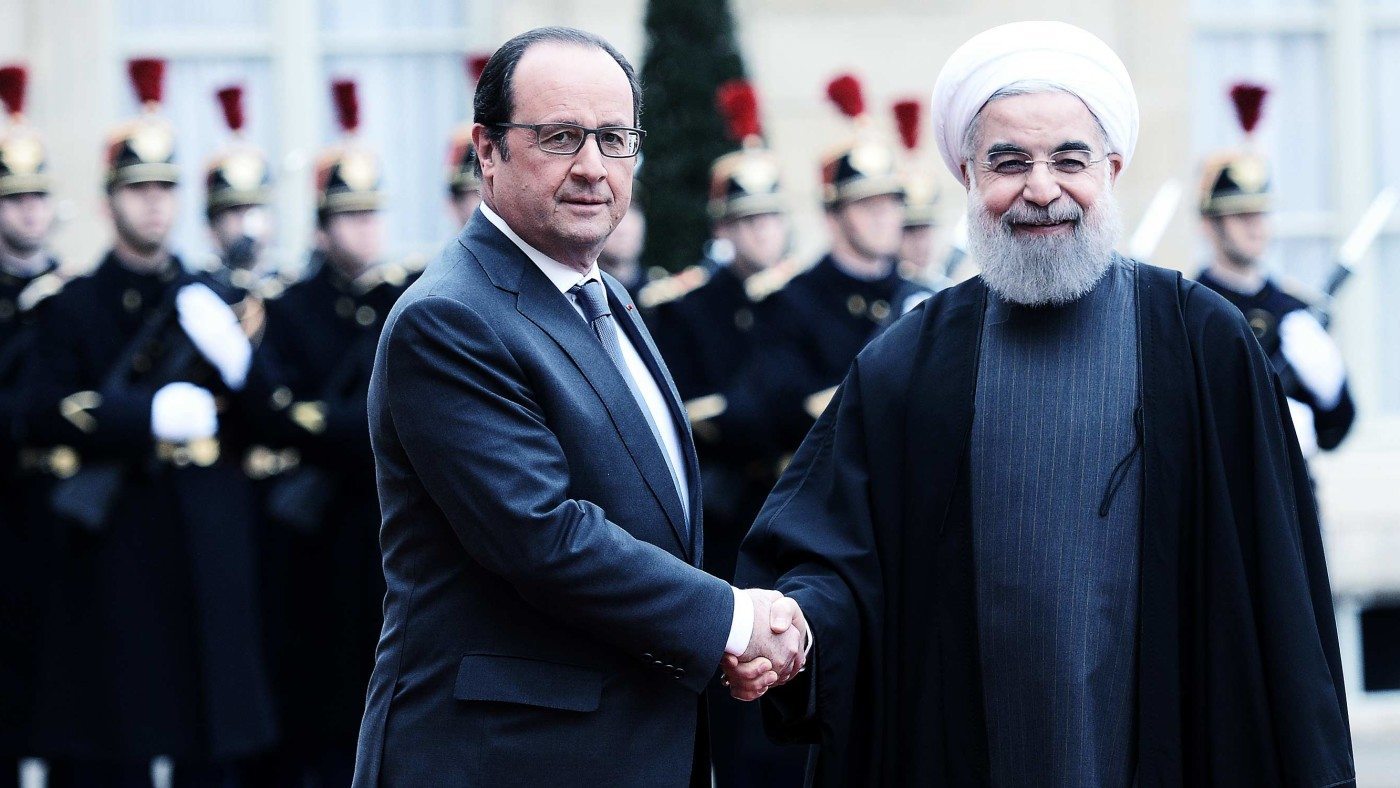The lifting of international sanctions against Iran last month following the Vienna nuclear agreement has led to a bonanza of European investment deals with Tehran. Iran’s President, Hassan Rouhani, has boasted of a “new spring” in relations with the European Union, and was recently feted on his visits to Paris and Rome. In the past two weeks, deals have been struck between French and Italian companies with the Iranian regime worth at least $30 billion. Mr. Rouhani was treated like royalty when he rolled into the Elysee Palace, and his effusive welcome on French soil was swiftly followed by the announcement of major contracts with Airbus, Peugeot and Total, which make France the leading Western investor in a pariah nation that had been shunned in recent years by most of the international community. As French Prime Minister Manuel Valls put it, “France is available for Iran.”
Not to be outdone, Germany, which has had a longstanding trading relationship with Iran – temporarily interrupted by EU and UN sanctions – has also invited Rouhani to visit Berlin, with Foreign Minister Frank-Walter Steinmeier urging the Iranian President to “keep Germany in mind as a destination on his next trip to Europe.” German corporate giants Siemens and Daimler are reportedly waiting in the wings on the Iran front, and German exports are expected to double within three years, and quadruple by 2021.
The spectacle of continental European companies and politicians queuing up to do business with Iran is ugly, distasteful and short-sighted. It does suggest that for many of Europe’s biggest powers, the Iran nuclear deal is largely about economic self-interest and not national security. Paris, Rome and Berlin view Iran as a lucrative market, with 78 million people, the world’s second largest gas reserves, and fourth largest oil reserves.
Europe’s capitals, however, are choosing to ignore the reality that Iran remains the world’s largest state sponsor of international terrorism and is rapidly building its ballistic missile capability, no doubt with the ultimate goal of being able to deliver a nuclear warhead. Iran’s ballistic missiles will pose a direct threat to Europe itself, and it will be logistically easier for Tehran to strike at the heart of a European capital than it will be to hit Washington DC several thousand miles away.
The removal of international sanctions provides Tehran with an immediate windfall of at least $100 billion, which it can plough into its military infrastructure as well as support terrorist groups such as Hezbollah and Hamas. In addition, European investment will provide Tehran with tens of billions of additional dollars in the next few years, with Germany joining their French and Italian counterparts.
European money benefits the Iranian government, not the Iranian people. The Iranian economy remains one of the most repressed in the world. According to the new Heritage Foundation/ Wall Street Journal Index of Economic Freedom, Iran ranks 171st in the world out of 178 countries listed, just ahead of Zimbabwe, Venezuela, Cuba and North Korea, with the private sector heavily marginalized. As The New York Times has pointed out:
“Behind the headlines announcing big business contracts with European companies it is becoming increasingly clear that, so far, the only deals being struck have been with the state-backed conglomerates. These are the groups that dominate major industrial and commercial sectors of the Iranian economy and are tightly controlled by pension funds and investment companies linked to state organizations, like the Revolutionary Guards.”
The Iran nuclear deal is disastrous for many reasons, not least because it will not prevent Iran from eventually becoming a nuclear weapons power, and does nothing to rein in Iran’s conventional military capability. Israel’s prime minister, Benjamin Netanyahu, denounced the deal as a “historic mistake,” one that will threaten Israel’s security as well as its very existence. Iran continues to be a deeply menacing, genocidal regime that talks of wiping Israel “off the map.”
Europe’s reckless, headlong rush to pour billions into the coffers of the Iranian government for financial gain, will reap the whirlwind in years to come. Strengthening the hand of a tyranny that brutalizes its own people, threatens its neighbours, exports terror, and seeks to have a nuclear-weapons capability, will ultimately bite Europe in the back. Great Britain should decline to hitch a ride on the foolhardy caravan to Tehran. And if Francois Hollande, Angela Merkel, and Matteo Renzi are serious about their own countries’ future security they should think twice as well before enriching one of the most brutal and dangerous regimes on earth.


